
25 minute read
Country Guide UK
from TWSM#10
Where to Work Country Guide UK
By THRASY PETROPOULOS
Advertisement
John Stevens is a Londoner. It is how he defines himself and it is probably how is father, working nights as a butcher in the city’s main meat market, Smithfield, also once defined himself. As a student, he turned down the opportunity of studying mathematics at Durham University, because he couldn’t stand being far from his mom and his beloved Arsenal Football Club, the place he calls home. Now in his 50s, he symbolically chose to locate his accountancy firm a literal stone’s throw from Smithfield Market. You get the feeling he wouldn’t want to be anywhere else in the world.
“It means opportunity,” he says without a moment’s hesitation when asked to describe what London means to him. “You can cut out whatever you need here. Whether that be your business life, your personality… your sexuality. There are no restrictions.” All too often, he points out, London – and England at large – is depicted in financial terms through the example of the still vibrant city or perhaps the inflated property prices that delight owners and leave most first-time buyers excluded. Easily forgotten is that the country still a hub for trade and higher education. And its political system, archaic and rigid in so many ways, is also among the most stable in the world. But it is the diversity of its residents, he says, which makes the place. England has evolved through the austere 70s, the yuppie 80s and the financially turbulent 90s. As for the start of the 21st century, the country is best described as a exhibiting a duality: as the euro zone burns financially, the English proudly wave their pounds to the rest of the world. At the same time, however, Britain’s economy is more indebted than any in the world other than Japan’s (see below). “There’s a starvation of cash at the moment. People aren’t spending as prolifically as they once did and Londoners, in general, are tighter with their money,” says John. “There’s still middle class money for things like food but there is less spending on clothes and the like. Banks aren’t lending to businesses. If you see money as energy, then there’s a lack of energy.”
REGENERATION & SUSTAINABILITY But a lack of energy should not be confused with a lack of buzz. Because London is buzzing. The endearing British mix of the lovably quaint and the frigidly pompous was nowhere better seen than during Queen Elizabeth’s Diamond Jubilee celebrations of 60 years on the throne. And after that, of course, comes the spirit of the London Olympics. Brits love to talk about the difficul-
Art critics now analyze the stencil-based techniques of canvas originals that began life as rain-splattered graffiti on random inner city buildings. It could only be Banksy, the (largely)
anonymous English street
artist who has done more than anyone to turn a subversive movement into an international art form.
A product of the now iconic 1990s underground scene in Bristol, west England, Banksy is famous for guerilla art that is appreciated as much for its political and social commentary as it is for its originality.
Where stenciled graffiti is commonly seen as coming a distant second to hand-painted street art, Banksy has developed a style that allows him to master cardboard stencil cut-outs in a workshop and then reproduce the product with great detail and speed on an unsuspecting wall. His latest high-profile work was inspired by the Queen's Silver Jubilee, featuring a boy hunched over a sewing machine stitching Union Jack bunting. Produced on the outside of a Poundland store in the lessthan-salubrious district of Haringey, in north London, the message is a clear one: the exploited workers of the developing world fashioning the luxury items of the west, and all at a time of so-called national celebration. [W banksy.co.uk]
01 Lenin on Rollerblades (Who Put the Revolution on Ice?) by Banksy. Courtesy of Bonhams
ties and thrills brought about by staging the Olympics in equal measure, just as they love to talk about their famously inclement weather. Local media recently reported that the Olympics – the bid for which was unexpectedly won back in 2005 thanks to the sustainability and regeneration plans for East London – could be worth 16.5bn pounds for London alone, driven mostly by construction projects. Where other host countries struggled to offload over-expensive tickets, London sold more than 90 percent of its tickets with just a fortnight to go before the Games. “The Olympics of today are far-removed from the state-sponsored vanity projects of the 1970s and 1980s,” wrote Patrick Foley, chief economist at Lloyds Banking Group, in the Daily Telegraph. “They are now as much about redefining their host cities and providing a catalyst for regeneration.” The “happiness affect,” he added, would boost consumer spending.
TOO MUCH DEBT And yet consider this assessment of a senior Morgan Stanley analyst, asked to
The manager's photo were taken by Jonni TM. He is an Icelandic born, award winning graphic designer, turned photographer, based in London, England and Oslo, Norway. Has has 20 odd years of experience from identity and packaging design for both large and small agencies. In 2005 Jonni turned his full attention to photography, shooting predominantly for advertising, mostly automotive and product photography. Jonni is well known for his intricate composite photography, portraiture and fashion projects. He's a partner and photographic director for Katachi Magazine. His work has been feature in numerous magazines and books worldwide.
[W behance.net/lhooq]
01
02
provide an overview of the UK economy for this article, and appearing here on condition of anonymity: “Like many other economies, the UK economy has too much debt. In fact, the UK economy is more indebted than all others except Japan’s, according to a McKinsey’s analysis, with debt running at 507% of GDP, well ahead of its European neighbors – Spain’s is 363% and Germany’s 278%. The UK’s debt position deteriorated significantly during the period of the last Labor government in office, ballooning from 310% in 2000. The figures are inflated by the UK’s relatively large banking sector but consumer debt is still relatively high verses peers. Government debt is actually less troubling, at 81% of GDP, although it rose under Labor with little tangible benefit.” He continued: “As a result of this and the government’s action to bring down the public sector debt over time, the bond market has remained relatively relaxed about lending to the UK, and the 10-year-gilts yield is at a record low of 1.55%.” Mixed signals, in other words. But there is also a clear warning: “Cutting the deficit may, however, prove difficult given the addiction to welfare that has built up in the last 20 years. Difficult decisions lay ahead with social unrest a risk.” The student riots of 2010 are, of course, still an unsavory memory for all Londoners.
AN EYE-CATCHING PLACE TO WORK
But the soul-searching that followed the looting and violence of the extreme end of those protests against state spending cuts in higher education couldn’t be further from the enthusiasm and confidence of Thilini de Silva, the marketing coordinator of London Vision Clinic, which specializes in corrective surgery. Thilini, born in Sri Lanka and raised in Australia, represents the international, multicultural and dynamic workforce to be found in the British capital. She talks with a smile and wide eyes about the experience of the daily commute on the London underground (“It’s like the United Nations”) and about the ability to fit in, whatever your character (“You can have purple hair and people won’t even give you a second glance”). “I came to England two years ago, straight from Melbourne, as the reces-
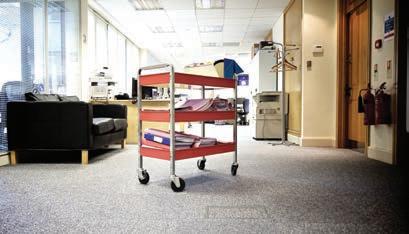

Wilson Stevens is an ap-
proachable firm, offering a wide range of first class services which are not only technically excellent but also delivered in a personal and friendly way. The firm’s partners and staff are as diverse as their clients. As a strong team, they possess the skill base required to help clients become “the best they can”. At Wilson Stevens they take the boredom out of accountancy, whilst at the same time being professional, compliant and intelligent.
01 Office details 02 John Stevens, owner of Wilson Stevens Accountants
[W wilsonstevens.co.uk]
Where to Work Country Guide UK
sion here was ending. When you graduate in Australia they teach you not to make any rash decisions, not to leave the country because they typically have graduate jobs lined up for you. I got a bachelor’s degree in commerce, majoring in accounting. The view from Australia was that everywhere else was in recession and London was the worst place to go. But I came and it worked out. I love it here.” Crucially, she is working for a successful company, set up ten years ago by school friends Craig Engelfried (managing director) and Dan Reinstein (head surgeon and medical director), London Vision Clinic entered the yearly awards for the first time last year. Thilini explains how the staff was thrilled to simply be included in the top 25 and was left speechless when they ranked second. “There is so much love at this office space,” she says. “It is like a family. There is attention to your wellbeing. The management is accommodating. When one person’s down, the others work extra hard to fill the gap.” A staff of 20 two years ago has now swelled to 45. “We just had our tenth anniversary party at London Zoo, where we asked patients to bring along anyone they felt might need eye surgery… To meet our surgeons and optometrists in a different environment, not clinical… To make sure they feel comfortable,” says Thilini. And confident, she might have added. It is not for no reason that the clinic – which mostly performs PRK (photorefractive keratectomy) and Lazik (laserassisted sub-epithelial keratectomy) surgeries and can see upwards of 100 patients a day – is located on Harley Street, a prestigious central London street associated with high-end medical care. They are selling reputation and trust as much as medical talent.
A CITY OF MINI VILLAGES
That is not to gloss over the fact that unemployment in the country is on the rise. The Guardian recently wrote that Britain is on course for returning to the days of 3 million people out of work, last seen in the early 90s. In May, joblessness reached 2.61 million, a rate of 8.2%. Almost 1 million of those have apparently been without work for more than a year.
The MoneyGram brand is
recognized throughout the world as a leading global payment services company. The diverse array of products and services offered enable consumers and businesses to make payments and transfer money around the world. From New York to Russia or London to India - in more than 194 countries - MoneyGram's money transfer service moves money quickly and easily around the world. [W moneygram.com] 01 Mark Perryman is the Senior Regional Director of MoneyGram 02 MoneyGram’s London office reception Gilles & Cecilie Studio is a
French/Norwegian partnership based in London providing illustration based design and art direction for various clients in a wide range of sectors. Their signature largescale murals have been commissioned by private persons and corporate clients as Paul Smith, Pepsico and HÀG. We have produced work for clients in the UK, USA, Japan, Italy, Norway, France and Brazil. [W gillesandcecilie.com] 03 Cecilie Barstad’s artwork 04 Cecilie Barstad’s inspiration 05 Cecilie Barstad’s inspiration 06 Cecilie Barstad, mirror reflection 07 Cecilie Barstad just outside her studio in the Shoreditch district in London 08 Cecilie Barstad takes a break The consequence – if your line of work supports it – is to be self-employed. And here, at least, there is more on offer than in other countries, with National Insurance (healthcare and pension contributions) relatively low and clear tax incentives. Cecilie Barstad and her partner in both life and work, Gilles Jourdan, have never had it any other way, having set up a graphic design business shortly after graduating from London’s Central St Martins, one of the premier arts and design colleges in the world. Working from their second-floor central London studio, Cecilie – a Norwegian – gives the impression of loving England and all that it has to offer. “We began working here after graduating and liked the network we started to build up,” she says. “London for us was neutral ground – we didn’t need to decide whether to move to Norway or France, where Gilles is from. Also, England is quite an easy place in which to set up a business. You don’t need much paperwork and you can start with just one pound in the bank. In Norway you have to think how much you will earn in the first year, maybe submit a business plan, and then prepay the taxes. Here, you don’t have to register for VAT until you earn more than 60,000 pounds which gives you a few years before you reach that limit – obviously depending on the earning potential of what you do.” Cecilie & Gilles (the way they brand themselves) now have a solid client base, around 70 percent of it abroad where, Cecilie explains, the prestige of being able to cut it in as competitive an environment as London counts. Also, she explains, there is inspiration everywhere in London, especially for graphic designers who prefer to carve out a name for themselves based around a unique style rather than conforming to market norms. “Just cycling around is inspiring – not taking the same road to work every day, going down different streets, being curious,” she says. “Cycling from Highbury to Shoreditch, past villas and parks and trees… There’s a little café on Highbury Corner called Maison d’Etre, a small and friendly business with great brioch-
03
es and jam. I go there in the morning from 7.30 to 9. I love the different parts of London – Soho, Shoreditch, Covent Garden, Notting Hill, Brixton for their specialities – London is really a city of mini villages. And I love spending time in some of the museums – the Tate Britain and the Tate Modern, but particularly the Tate Britain with the rooms upstairs with Bacon, Singer Sargent and other British painters.”
THE CENTER OF THE FINANCIAL WORLD Being British is, of course, something that the country trades on: a reputation for honesty, integrity and quality. Or, at least, that’s the theory. The great British reputation has come in for a beating of late. First it was the parliamentary expenses scandal of 2009, where MPs were found to be routinely misusing permitted allowances – some in excess of 100,000 pounds each. Then came the News of the World and wider phone-tapping scandal associated with the Murdoch newspaper empire, where the ethics of a large section of Britain’s journalism were laid bare for all judge.
02





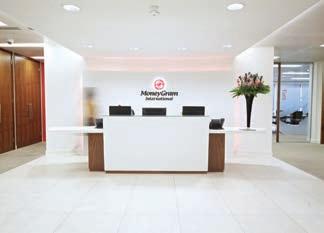


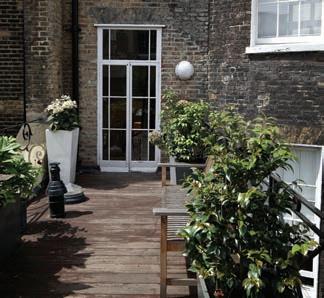
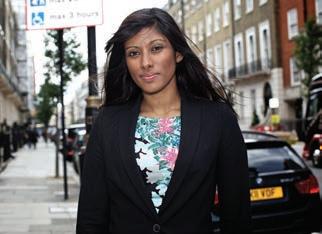

And most recently there has been the Libor scandal, where interest rates were manipulated being in British financiers and beyond. All three have been viewed as proof of an erosion of professional ethics, or perhaps an indication that the ethics in some fields that have long traded on their solid reputation were actually never what they claimed to be. This is nowhere more sensitive than in the services sector that has overtaken manufacturing as Britain’s core commercial edge, and particularly the financial services that are epitomized by London’s world famous Square Mile – otherwise known as the City. There are, however, still those who are willing to vouch for England’s financial integrity and point out that – beyond the notable examples – its status still holds strong. Notably, all the above scandals were exposed in the press and have involved vigorous investigations, some of them criminal. In the case of the ongoing Leveson enquiry into media standards, former prime ministers were called in for cross examination. Added to that, many international financial institutions seek a City address as much now as during the strutting 80s. “Financial services are still a very important part of the UK economy,” explains Mark Perryman, Senior Regional Director of MoneyGram for the UK, Ireland and the Nordic countries. “As Britain’s manufacturing heyday is well behind us, something had to take its place and that is the services industry, and financial services are very much a part of that.” Explaining the location of the money transfer company’s regional headquarters, he said: “we are based in EC4 - the City of London. If you travel around the City from 8am to 7pm the energy and hubbub on the streets is amazing. You can see everyone going to work and engaged in all the various companies.” He continued: “And of course we also have another commercial center that has emerged in the last 10 years or so in Canary Wharf, a previously run down area east of the City of London. Through a process of regeneration a mini financial city has emerged there and all the major players – not just UK names but also Japanese, American and other worldwide banks and trading companies – now have a presence there. Going back
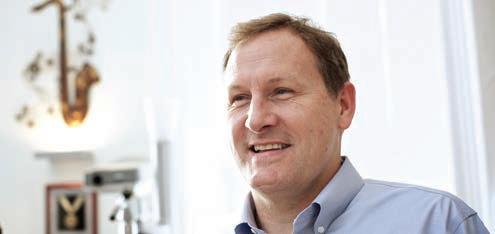
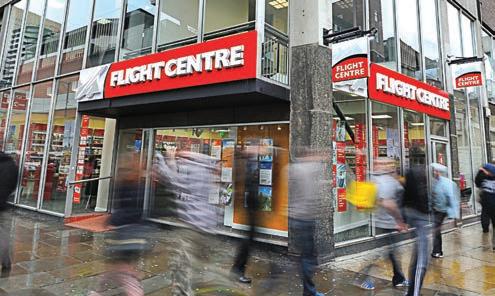
The London Vision Clinic
is a medical facility offering LASEK and LASIK surgery. They are the only clinic to offer Laser Blended Vision since 2005 - a treatment aimed at resolving the need for reading glasses.
[W londonvisionclinic.com]
01 A sunny day on the London Vision Clinic’s patio 02 Thilini De Silva, Marketing Coordinator of the London Vision Clinic 03 Dan Reinstein, Head Surgeon and Medical Director of the London Vision Clinic 04 Craig Englefried, Managing Director of the London Vision Clinic 05 Flight Centre office exterior
centuries, the UK has always had a trading history and if you have international trade, international finance tends to go along with that. I think the UK still has a strong reputation for honesty, transparency and lack of corruption, and the imposition of the rule of law. Geographically we are also well placed, with the US to the west and Asia to the east. Asia occupies the morning and the US the evening and night. Business is a truly 24-hour operation and that can only be to the UK’s advantage.” It’s hardly surprising, then, that MoneyGram – which is headquartered in Dallas, Texas, and operates in almost 200 countries and has a network of approximate 260,000 locations from which money can be transferred and received within 10 minutes – has developed into a 1 billion US dollar a year business. That said, with video conferencing and the ease of electronic communication, it begs the question of whether it is still important to invest so deeply in a central London regional base rather than opt for a cheaper location on the city outskirts. “It would be a very sad day when local communication and contact with people
Flight Centre Limited (FLT)
is one of the world’s largest travel agency groups, with more than 2000 leisure, corporate and wholesale businesses in 11 countries. FLT’s rapidly expanding network now extends throughout Australia, New Zealand, the United States, Canada, the United Kingdom, South Africa, Hong Kong, India, China, Singapore and the United Arab Emirates. After starting with one shop in the early 1980s, FLT has enjoyed remarkable ongoing growth. The company employs more than 13,000 people globally and has more than 30 brands, including the flagship Flight Centre leisure brand.
[W flightcentre.com]
The UK List
of Best Workplaces
By Tom O’Byrne, Chief Executive Officer Great Place to Work® Institute UK.
Many of the UK's Best Workplaces are either headquartered in London or have an operation in London and may be headquartered elsewhere. Two key sectors are well represented - professional services sector and financial. This is our 12th successive year of awarding UK companies. The current work climate has obviously been impacted by the same economic factors affecting much of the western world. But the UK economy is not all doom and gloom – in fact, the latest figures show that it is outperforming the Euro zone! According to the report, the British economy has weathered the global weakness rather well. And our own research shows that Best Workplaces are in a better position than non-Best Workplaces to withstand difficult economic conditions. The economy depends on the companies in the private sector to create wealth and, in the context of large cuts in public spending, it is even more imperative the private sector is able to create jobs. This means new start-ups as well as existing businesses being able to grow. Whilst the government recognizes this, the support is not always there, can be difficult to find, is biased regionally (i.e. support more easily available in some parts of the country than others) or simply is insufficient. Companies, particularly SMEs, are affected by increased government red tape and lack of loans from banks which they need to help fund business expansion. They also face skills shortages. Apprenticeship schemes, which help give young people the support they need in finding meaningful jobs and a skill – and providing companies with the skilled workforce they need now and long term – are improving but the financial support offered is not always sufficient and/or can be difficult to obtain. Examples of how the government can help existing companies would include: reducing corporation tax and National Insurance, cutting bureaucratic red tape, and providing more leadership/ management/entrepreneurial support to business to help them strategically plan their businesses growth TOM O’BYRNE
Great Place to Work UK 2012
Category: Large
01 Admiral 02 Capital One Europe Plc 03 McDonald's Restaurants 04 Quintiles Ltd. 05 Beaverbrooks the Jewellers 06 Microsoft Ltd 07 Bright Horizons Family
Solutions 08 Telefonica UK Ltd 09 Flight Centre UK 10 Ernst & Young Ltd
Category: Medium
01 Baringa Partners 02 Impact International 03 National Instruments Corp. (UK) Ltd. 04 Twinings UK & Ireland Ltd. 05 NetApp UK Ltd. 06 eBay 07 UKFast 08 Brand Learning Partners Ltd 09 Lansons Communcations 10 Softcat Ltd
Category: Small
01 Intuit 02 London Vision Clinic 03 Star 04 Virgo Health Ltd 05 Material Communications
Group 06 Summer Isles Hotel 07 Timothy James Consulting 08 Amoria Bond 09 Seren Partners Ltd 10 Xoomworks
Great Place to Work® Institute UK
Angel House 225 Marsh Wall London E14 9FW T + 44 870 608 8780 [W greatplacetowork.co.uk]
Where to Work Country Guide UK
didn’t count for anything,” believes Perryman. “We’re dealing with stakeholders, the various regulatory bodies, the financial services authorities… Clearly there are huge advantages to being local and being able to meet and talk to people. I think there will always be that need for local operations wherever you’re headquartered.”
THE FAMOUS PROPERTY LADDER
So when all is said and done, money still underpins much of what happens in England. And with money comes another industry for which England has become famous (or perhaps infamous): property. And once again, we’re back to the country – and principally the capital – representing a duality that simultaneously rewards and excludes. If you’re lucky enough to own a property in the UK, then odds are you’re sleeping on a hefty profit when it comes to capital gains. Where cash has dried up in other industries, property prices have maintained and often gained in value, even if sales have dipped. It can be explained by simple economics, says Chris Underhill, an established estate agent in north London who has lived through decades of steady – and sometimes steep – property price rises. Demand still outstrips supply, he explains. “I’m confident about the prime London market because the capital is short of approximately half a million homes. Demand has been consistently high and property values continue to show steady growth of between 3% to 4% per year right the way through the recession.” He noted, however, that the property prices in his area of north London (Highgate and Muswell Hill, in particular) continue to exclude most first-time buyers, meaning that a generation of Londoners are still unable to get even a toe-hold on the market. “Property prices are so high in this part of London that you need about 250,000 pounds just to get onto the property ladder. Most local first- and second-time buyers are DINKYs –Double Income, No Kids Yet,” he says. Describing himself as a local lad, born and bred, he has been selling property in the area for 35 years, establishing Pricket Ellis & Underhill in 2000. “I’d find it impossible to move away from the vibrancy of the city and its incredible facilities, which I believe are second to none around the world, and its cosmopolitan feel,” he says.
GETTING OUT OF HERE
The same is probably true of so many residents around the country. At the same time, however, the English have a singular motivation to leave their country as often as possible – even if only for a week at a time. For all the talking up of the country, there is no getting away from the fact that England suffers for its climate. Famously miserable at the best of times, 2012 has been a particularly bad year. April was the wettest for a century and, just when locals thought it really couldn’t get any worse, this year’s June was the wettest since records began. Flight Center UK – another company to make it on to the latest Best Place to Work UK listings – is testament to that, with Amy Lucas, the Group PR Manager explaining that it, too, has bucked the recessionary trend. “We’ve just released our profit guidance for the 2011/2012 fiscal year and, despite the financial turmoil in Europe, the Flight Center Group UK is on track to deliver about 15 million pounds in earnings before interest and tax – 50% year on year growth.” “People will make sacrifices elsewhere in order to go on holiday,” she explains. “We’ve seen fewer people travelling to Australia but a rise in bookings to both the Indian Ocean and the USA. Thailand also remains a popular destination, with more of a sway towards last-minute European bookings. The weather in the UK has been particularly bad and people are looking for guaranteed sunshine with a favorable exchange rate.” So a country that has a tendency to simultaneously reward and exclude is also one where in which many of its residents couldn’t imagine living anywhere else but are willing to (temporarily) leave at the drop of a hat. Duality to the last. •
Shop Floor Philosopher
Behind a busy north London road, there is a small lane, not even one hundred meters long, with a few industrial lock-ups. These are home to a few local businesses including a car mechanic. Zuki is a 67 year old Turkish Cypriot, who when he first arrived in the UK, made his living as a fashion designer. He decided to change his profession however, after his love of speed and cars lead him to become a mechanic. He has recently re-located and now works alongside his friend Akin after losing his large garage little more than 500 meters away. He is a member of a skydiving and paragliding club and constantly seeking other thrills. His wife frequently asks him when he’s going to grow up, thinking he’s crazy. However whilst admitting he is an old man he says “speed and the sky are the limits for me.” Although the garage itself is a busy workplace, the atmosphere is more reminiscent of a Turkish coffee shop, friends and relatives will drop by to ask for advice, or just for an extended chat, with many staying for a whole morning, helping out with the various jobs if needed. Within all this, Zuki shows himself as a very astute shop floor philosopher, feeling that “anything and everything is possible in this world.” Copyright © 2012 Alexander Walker is a documentary and reportage photographer based in London. 01 Cans of spray paint and lubricating oil. 02 Empty cans of lubricant and oils. 03 The office is open to anyone in the workshop. 04 Ibrahim Zuki has lived in north London since the early 1960’s. 05 Zuki and Ecevit ... at the end of a long, busy day. 06 Working underneath a classic Mini Cooper. 07 Akin, the workshop owner watches over Zuki, in a reflection. 08 Ecevit is one of the many assistants in the garage. 09 Zuki’s speciality is his coach work, taking great pride in being able to build and make anything “If I haven’t got it, I can create it, out of the blue” 10 A London minicab driver waits. 11 In a break from work on the underside of the car. 12 Occasionally there is no work. lubricating oil.
01 —02



04
07—09
11 03
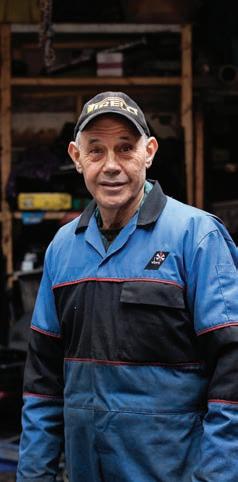
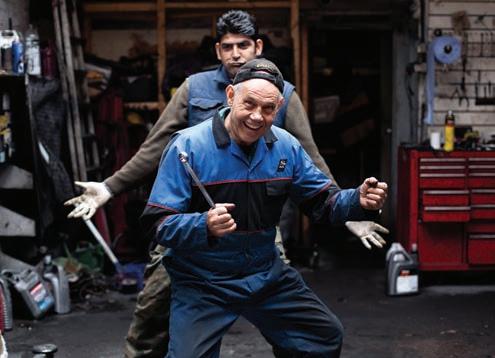
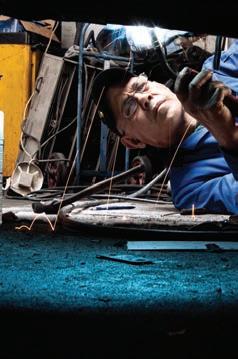
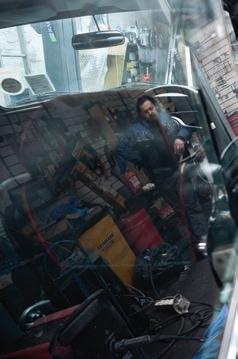
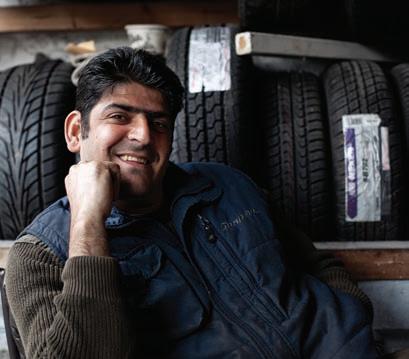
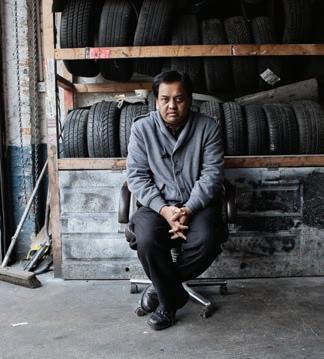

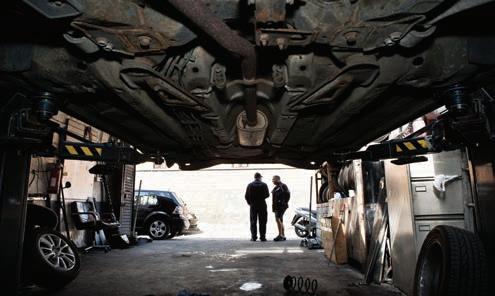
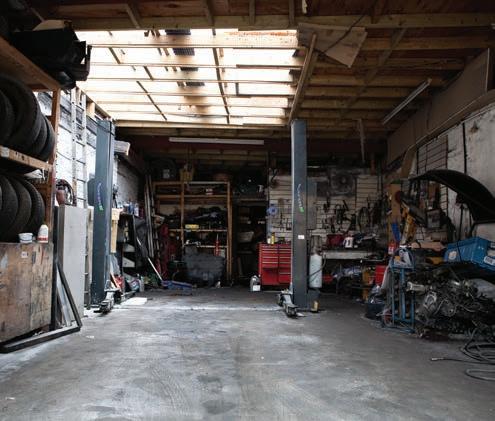
05—06
08-10
12
t ws m — #10.12

